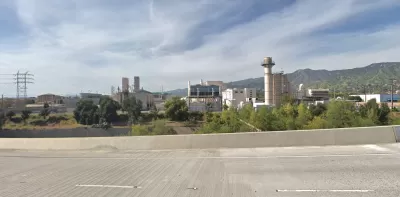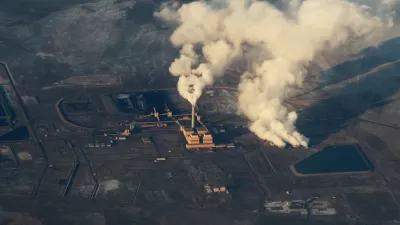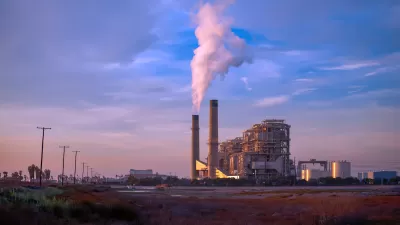Most of the aging 350-megawatt Grayson Power Plant, operated by Glendale Water & Power, will be retired by 2021. The city's utility district has struggled with how to repower it. A compromise reached last month ensures low emissions and reliability.

In April 2018, the city council of Glendale, the fourth largest city in Los Angeles County, opted not to spend $500 million to repower the Grayson Power Plant, built between 1941 and 1977 (with the notable exception of a peaker unit built in 2003 that will remain in operation), as a 262-megawatt natural gas power plant but instead chose "to study clean energy options," reported Julian Spector for Greentech Media (GTM) on April 18, 2018.
"This is a place for the clean energy sector to step up and show that they can do this,” said Angela Johnson Meszaros, an Earthjustice attorney who testified on behalf of the Sierra Club. “If they don’t, the city will approve this power plant and the takeaway will be that the clean energy solutions aren’t there.”
Fast-forward 15 months to July 23 and the outcome is indeed much greener, reports Spector on July 30 (source article). After reviewing an array of clean energy alternatives, the municipal utility district believes it has "selected a diverse portfolio it says will meet reliability needs and save ratepayers $125 million compared to the old portfolio."
In other words, Glendale Water & Power (GWP) went through an energy transition in a little over a year.
The final portfolio, proposed in Glendale Water & Power's new integrated resource plan [pdf], would repower the Grayson Power Plant with a 75-megawatt/300-megawatt-hour Tesla battery installation and up to 93 megawatts of fast-ramping Wärtsilä [natural gas-powered] engines.
In addition, on-site solar panels, distributed generation, and energy efficiency programs will add 50-megawatts to the repowering. But it was the battery storage that made the cleaner alternative possible, notes Spector.
When the earlier planning process started back in 2014, batteries were not on the menu of cost-effective options, so a recognized capacity need — in this case, the retirement of a plant that dates back to the 1940s — essentially guaranteed a gas plant solution.
Since then, large-scale batteries have become competitive, but so have networks of small-scale energy devices [enabling microgeneration] located in homes and businesses.
In fact, Spector reported in June that a 20-megawatt, 80-megawatt-hour lithium-ion battery system will replace a jet-fuel burning peaker plant up the coast in Jack London Square, Oakland.
"It’s an astounding victory," said Meszaros of EarthJustice. "It really does highlight what it looks like when the community turns out and demands better. And good on the Glendale City Council for letting better happen."
End of new natural gas-powered plants in California?
Which brings us to the city council's unanimous vote on July 23 to support the cleaner alternative, reported by Brandon Yung for LAist, affiliated with Southern California Public Radio, in his aptly titled article, "Glendale Approved What May Be California's Last Natural Gas-Lit Power Plant."
Environmental activists had opposed any new gas-fired infrastructure. About 400 protesters showed up at city hall on July 9 to rally against rebuilding the plant, casting it as a reinvestment in fossil fuels during a time of climate crisis.
But they supported approving the plan when the city agreed to attach several conditions suggested by the Glendale Environmental Coalition and Sierra Club...
Glendale Water & Power staff assured the city council that the plan, even with the gas component, will allow the utility to achieve a renewable portfolio standard of 100 percent renewables by 2045, the mandate set by Senate Bill 100. In fact, they are looking into meeting it by 2030, according to Lila Seidman's report in the Glendale News-Press on the council's approval.
Spector agrees with Jung that "[w]ith Grayson's original repowering off the table, viable new gas plant proposals appear to be extinct in California."
Calpine in May abandoned its Mission Rock peaker on the Santa Clara River [in Ventura County], and local opposition scuttled NRG's Puente Plant, which would have occupied the beach at Oxnard [Ventura County]. Los Angeles Mayor Garcetti canceled the renovation of three gas plants in his city's municipal utility territory, committing to entirely clean energy instead.
However, an 840-megawatt natural gas plant was approved by Los Angeles – though that will be built in Millard County, Utah, to replace a much larger coal-powered plant which will shutter in 2025. Glendale will also participate in repowering the Intermountain Power Project – the resolution was placed just below the adoption of the Integrated Resource Plan for the Grayson plant on the July 23 agenda [pdf].
Related in Planetizen:
-
Shuttering a Large Coal Plant: A Tale of Two States, July 23, 2019
-
L.A. Collects Green Bonafides By Canceling Plans for Natural Gas Power, February 15, 2019
Hat tip to Earth Justice's Right to Zero campaign.
FULL STORY: Another California City Drops Gas Peaker in Favor of Clean Portfolio

Planetizen Federal Action Tracker
A weekly monitor of how Trump’s orders and actions are impacting planners and planning in America.

Restaurant Patios Were a Pandemic Win — Why Were They so Hard to Keep?
Social distancing requirements and changes in travel patterns prompted cities to pilot new uses for street and sidewalk space. Then it got complicated.

Map: Where Senate Republicans Want to Sell Your Public Lands
For public land advocates, the Senate Republicans’ proposal to sell millions of acres of public land in the West is “the biggest fight of their careers.”

Maui's Vacation Rental Debate Turns Ugly
Verbal attacks, misinformation campaigns and fistfights plague a high-stakes debate to convert thousands of vacation rentals into long-term housing.

San Francisco Suspends Traffic Calming Amidst Record Deaths
Citing “a challenging fiscal landscape,” the city will cease the program on the heels of 42 traffic deaths, including 24 pedestrians.

California Homeless Arrests, Citations Spike After Ruling
An investigation reveals that anti-homeless actions increased up to 500% after Grants Pass v. Johnson — even in cities claiming no policy change.
Urban Design for Planners 1: Software Tools
This six-course series explores essential urban design concepts using open source software and equips planners with the tools they need to participate fully in the urban design process.
Planning for Universal Design
Learn the tools for implementing Universal Design in planning regulations.
Heyer Gruel & Associates PA
JM Goldson LLC
Custer County Colorado
City of Camden Redevelopment Agency
City of Astoria
Transportation Research & Education Center (TREC) at Portland State University
Camden Redevelopment Agency
City of Claremont
Municipality of Princeton (NJ)




























